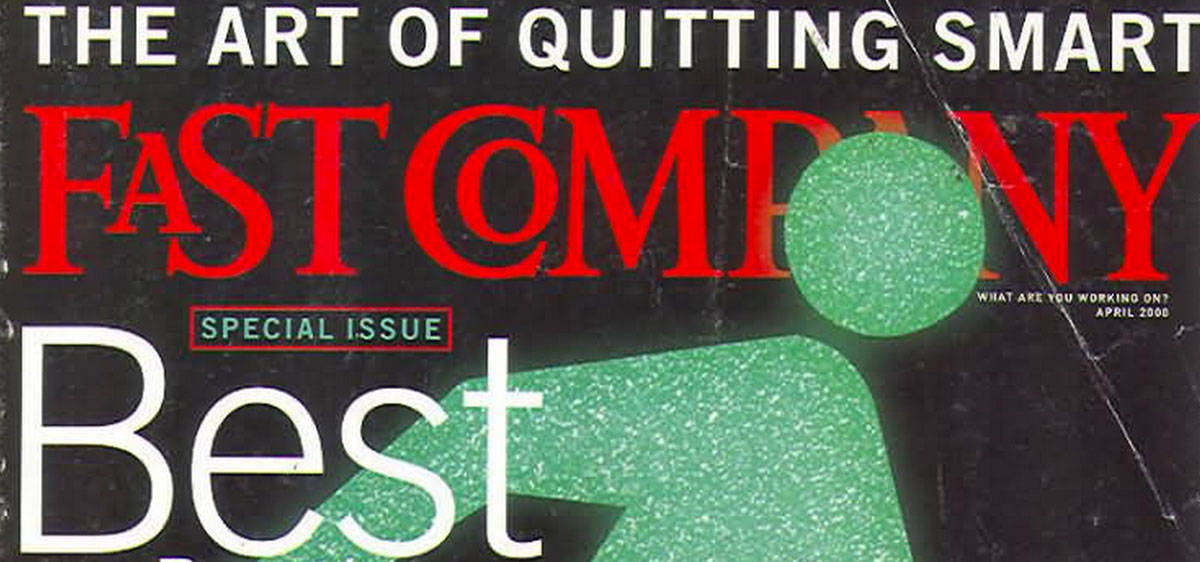BrainStore in Fast Company
Fast Company. One of the most inspiring US tech magazines

Where do great ideas come from? They come from right here, actually. At the intersection of Plankestrasse and Rueschlistrasse, in Biel, Switzerland (also home to Rolex and Swatch), there is a cream-colored industrial building — a factory that manufactures and sells ideas. All kinds of clients have come here, seeking all kinds of ideas: Novartis, the pharmaceuticals giant, came to find ideas for new food products; the Swiss Cancer Association came looking for ideas on how to promote the use of sun-protection products; and a 70-year-old woman once came in search of an idea that might help her fall in love again.
And this idea factory filled every order. The BrainStore, as this fast-growing operation is called, is the brainchild of Markus Mettler, 33, and Nadja Schnetzler, 27. Along with their 31 colleagues, Mettler and Schnetzler have developed a creative approach to the hard work of creativity. Their central proposition: You can't rely on rare flashes of brilliance — "eureka moments" — if you want to produce a steady stream of good ideas. Instead, you must approach the manufacturing of ideas with as much rigor and as much discipline as you apply to the manufacturing of assembly-line products. "Our idea factory has all of the elements of an industrial process," Mettler explains. "You can follow an idea from one step to another."
But don't get the wrong idea. There's nothing bureaucratic about the BrainStore's idea-generation process. Indeed, the first stop for every project is the Creative Lab, a large, airy room filled with all kinds of supplies for different projects: glitter, glue, crayons, beads, colored paper, model-building gear — and a white, cast-iron bathtub to remind employees that (as Mettler says) "great ideas start with completely unrealistic thoughts." If you're serious about being creative, he argues, you've got to give yourself license to be playful.
With that in mind, whenever the BrainStore faces a truly big creative challenge, it calls in the big guns: kids. The BrainNet is a 1,500-person global network comprised mainly of young people aged 13 to 20 (some adult professionals are also involved), who help the BrainStore by scouring the world for new trends and offbeat sources of inspiration. "We're not looking for average ideas," says Mettler. "We're looking for crazy ideas. We use kids to find those ideas, because they know how to talk without letting their thinking get in the way."
The BrainStore mixes these young people with members of its client teams during creative workshops. "One of the ideas behind the company was to blend the professionalism of experts with the unbridled enthusiasm of kids," says Schnetzler. Adds Mettler: "We have 17-year-olds working on products and campaigns for such companies as Nestlé and the Swiss railway. It's cool for kids to be able to say, 'Hey, I was a part of that.' "
Last December, for example, nine kids visited Biel to brainstorm with five executives from Credit Suisse, one of the country's top banks. They faced a thorny issue: how to phase out a passbook-savings plan that Swiss families had cherished for years but that bank employees had come to see as obsolete. The cross-generational teams developed a set of scenarios that led to a stream of raw ideas. Later, those ideas will go through the remaining steps in the BrainStore assembly line: compression (in which a team of in-house employees and outside experts sorts through ideas and picks out the best ones); testing (research and prototype); and finishing (marketing campaigns and positioning strategies). Separating the process into steps, argues Mettler, keeps innovation flowing. "Creativity can cause a lot of confusion," he says. "When a group starts brainstorming freely, it will often digress after just three sentences. Or you get people trying to synthesize ideas while they're acquiring ideas, or trying to acquire ideas while they're compressing ideas. Then the whole system pretty much gets out of whack."
But, by breaking the creative process into steps and developing tools to optimize those steps, this idea factory is able to run at an ever-faster pace. "We're striving to perfect our system in terms of speed and efficiency," says Mettler. And for that reason, he insists, the BrainStore will never run out of ideas.
Contact Markus Mettler by email (welcome@brainstore.com), or visit the BrainStore on the Web (www.brainstore.com).
Sidebar: Ideas While You Wait
"The BrainStore" is a fun name for a group of smart creativity consultants whose clients include some of the world's biggest companies. But it's more than just a name. Along with offering consulting services, Markus Mettler and his colleagues run a store that actually sells over-the-counter creativity. One customer walked into the store (it's attached to the
factory) in search of ideas about what to say in his wedding speech; a woman came in looking for a special way to celebrate her father's 50th birthday; and a group of schoolgirls visited to learn how to make their classroom look better.
The BrainStore outlet helps customers meet creative challenges — usually within 15 to 30 minutes, and usually for less than $20. "We spent about a year developing the idea for an idea shop," says Mettler. "We realized that it's possible to compress the entire idea-generation process into just 15 minutes. While that may not be enough time to develop a new product, it is enough time to name a hamster."
And that's the real value of this retail outlet: It continues to shed light on the process required to generate any idea. "The most important thing that you can do is to open your eyes and your mind," says Urs Heer, 29, the BrainStore's chief of production. "And it helps to think fast. Without speed, people get bored, and boredom allows for distraction. That's true whether you're working with Nestlé or with a little-old lady who wants ideas on how to handle her cat."